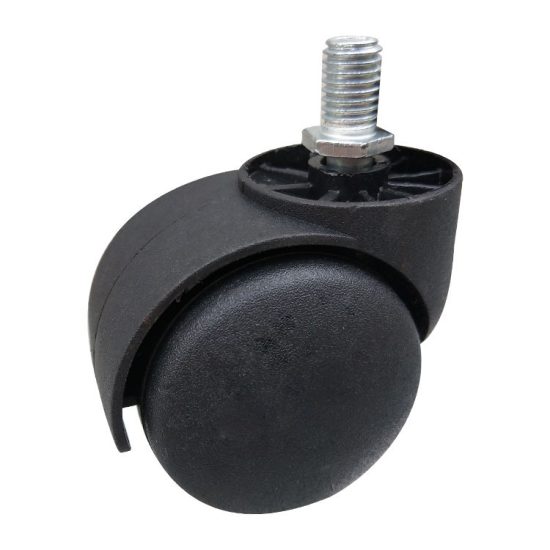The choice of caster material is crucial to ensure that the caster performs well in its intended application and environment. Different materials are used for caster wheels and frames, each with its own set of properties and advantages. Here are some common caster materials:
- Rubber: Rubber caster wheels are known for their shock absorption and traction. They are suitable for indoor use on hard floors and can help protect delicate flooring surfaces from damage. They are relatively quiet and provide a cushioned ride. However, they are not well-suited for outdoor use or in the presence of chemicals and oils.
- Polyurethane: Polyurethane caster wheels are durable and versatile. They work well on both hard and soft floors and are resistant to most chemicals, oils, and solvents. They are quieter than metal wheels and provide a smooth and quiet roll.
- Nylon: Nylon caster wheels are durable and offer good load-bearing capacity. They are resistant to many chemicals, oils, and greases. Nylon casters are typically used in industrial settings and can handle heavy loads. However, they can be noisy and are not as cushioned as rubber or polyurethane wheels.
- Metal: Metal caster wheels, often made of cast iron or steel, are extremely durable and designed for heavy-duty applications. They can handle high loads and are resistant to extreme temperatures, chemicals, and wear and tear. However, metal wheels are noisy, can damage floors, and are best suited for rough and uneven surfaces.
- Phenolic Resin: Phenolic resin wheels are made of a synthetic material that is both durable and economical. They work well on smooth surfaces, are resistant to oil and grease, and have a high weight capacity. They are quieter than metal wheels and suitable for medium-duty applications.
- High-Temperature: High-temperature caster wheels are designed to withstand extreme heat. These are typically used in applications where regular caster materials would melt or degrade, such as bakery ovens and foundries.
- Cast Iron: Cast iron wheels are known for their exceptional load-bearing capacity. They are heavy-duty wheels and are often used in industrial applications, including heavy machinery and manufacturing.
- Stainless Steel: Stainless steel caster wheels are corrosion-resistant and suitable for use in food and medical industries, as well as environments where sanitation is critical.
- Pneumatic: Pneumatic caster wheels have air-filled tires and are suitable for outdoor use or on rough and uneven surfaces. They provide a cushioned ride and shock absorption, making them ideal for applications such as carts and garden equipment.
When choosing the caster material, consider factors such as load capacity, floor type, environment, noise level, and the specific demands of your application. It’s important to select the right caster material to ensure the longevity and performance of your casters in their intended setting.


